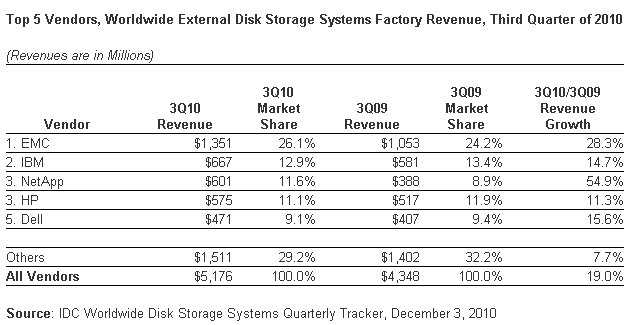Dell acquires Compellent for $960 million, lands its storage consolation prize

Dell finally got its storage acquisition. On Monday, Dell said it is officially buying Compellent in a deal valued at $960 million, or $27.75 a share.
According to Dell, the Compellent acquisition will allow the company to better focus on data management, thin provisioning and storage for cloud computing shops.
After a failed bid to acquire 3Par---Dell lost out to Hewlett-Packard---the company needed to do something to bolster its storage line-up and remain a top 5 player. EMC is the storage leader and then the field is bunched with the likes of HP, NetApp and IBM. Dell was at risk of being on the outside of the storage pack.

Dell said last week that it was in talks with Compellent. However, Dell's bid is much lower than where Compellent was trading just last week. Before Dell disclosed the acquisition talks, Compellent shares were trading north of $33. Analysts said there is about a 15 percent to 20 percent chance that another player such as Oracle or HP would try to outbid Dell and buy Compellent.
The company will add Compellent to its storage portfolio, which includes PowerVault, EqualLogic and a venture with EMC. Dell said that Compellent will allow it to hit every storage tier. Dell hasn't been shy about acquiring storage companies that fill in line-up gaps. Brad Anderson, senior vice president of Dell's enterprise product group, said in a blog post:
Over the last two years, we have acquired technologies that work behind the scenes with intelligence to abstract the complex and provide true business value to our end users. This was certainly true with EqualLogic and was illustrated with the acquisitions of Exanet and Ocarina. One similarity across all of these acquisitions is the ability to address customers’ data management issues.sen
On a conference call, Anderson said:
In the storage industry, there are too many point solutions. There are primary solutions, secondary, backup, and archival. There is iSCSI and fiber. There is block and file. Too many of these solutions are all about technologies and not about addressing customer requirements. Customers want to buy based on their requirements. These are things like capacity, performance, latency, and cost point. And they want solutions that are not just about how you store the data, but how you manage the data.
Customers want to be able to have storage on primary and easily move it to secondary and back it up, and at some point, archive the data. They want to be able to de-dup the data early in its life and manage it throughout its life, rather than just before they archive it. You can't accomplish this when you have all these point solutions that are incompatible with each other. You can't really have data mobility. At Dell, we aren't protecting any of these legacy set of platforms, so we really feel that we're in a great position and are making investments that allow us to deliver unified storage and deliver true data mobility.
For Compellent, Dell said it will largely be business as usual. Dell will keep Compellent in Eden Prairie, Minn. and continue to invest in the company and its channel program.
Analysts generally agreed that Dell's move to purchase Compellent made sense. Wedbush analyst Kaushik Roy said in a research note:
We believe it makes sense for Dell to buy Compellent (which makes entry and mid-range storage systems), because Dell’s server products are adjacent to storage systems. Dell’s EqualLogic storage product has a high gross margin (close to 60% by our estimate) and has grown revenues very fast. We see CML as a good addition to Dell. Dell needs to move up in the datacenter by providing more of its own value or IP (Intellectual Property). In our opinion Dell should also buy Brocade (with roughly 70% SAN switch revenues and 30% Ethernet switch revenues) to compete with HP and Cisco. Getting into networking would help Dell improve its margins. Note that in this industry networking gross margins are in the 50%+ range, server margins in 20%+ range and PCs in teens.
The big wild card here is what happens with Dell's relationship with EMC. This worry over EMC appeared as Dell tried to buy 3Par and the story is largely the same. Dell sells EMC gear to target the mid- to high-end storage market, but there will be some Compellent overlap. EMC, however, is also likely to go after the entry level market. In any case, it's quite possible that the Dell-EMC relationship is going to downshift at some point. Dell resells about $500 million in EMC gear a year.
Related: Dell to acquire Ocarina Networks to boost data management offerings